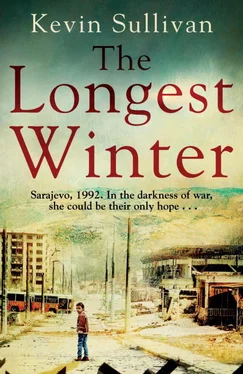Her mother owed money and couldn’t pay it back. She guessed that much.
Milena’s Aunt Jasna lived on the other side of town, near the police station. Sometimes her mother went there in the afternoons so Milena thought she might be hiding there now.
Neither of the debt collectors rose to stop her when she hurried back out of her own house. She listened for the sound of them, but they just sat there in the front room, smoking, as though they owned the house already.
She ran out onto the street and put some distance between herself and the men. Then she walked more slowly because she was afraid she might reach her aunt’s house only to find that her mother wasn’t there. For twenty minutes she could imagine that her mother would be sitting at Jasna’s kitchen table smoking Kent cigarettes and that she would look at Milena with the expression she used when they were in big trouble – she would raise her eyebrows and tell Milena brightly and unconvincingly that everything would be all right.
Milena turned onto the main street leading down to the river and walked past the supermarket with her head down. She wondered if her mother had gone away in order to be with her father. She thought that, if her mother went to be with her father, they would both come back together. Her father would pay the men whatever it was they were owed and then Milena and her mother and father could live together again.
She imagined walking down the street with the two of them and ran the last two hundred yards to Jasna’s house.
Jasna opened the door and looked over Milena’s shoulder as she ushered her inside. Milena knew then that Jasna knew.
‘Your mama had to go away,’ she said, sitting down at the kitchen table with Milena opposite her. Jasna had been crying, Milena could see.
That night Milena slept on the sofa in the sitting room. She was relieved that Jasna didn’t invite her to sleep in her bed. That would have made Milena feel awkward. She didn’t want to pretend that Jasna was her mother, she didn’t want Jasna to hug her or cry or tell her that everything was going to be OK. Jasna wasn’t that kind of person. She spoke to Milena as though they were the same age.
The next day they left together for school, ten minutes earlier than Milena usually left, because Jasna said she had to come and speak to the headmaster before going to her work at the bottling factory. Milena waited outside the headmaster’s office. After a few minutes he stepped out. Milena looked at his waistcoat and jacket: she didn’t want to look him in the eye. She noticed the shininess of his grey suit, and heard an unusual and disconcerting warmth in his voice.
She knew by then that her mother would not be coming back. She had accepted – in a deep, dark way – what in years to come she would begin to understand. But the uncharacteristic warmth in the headmaster’s voice was another thing. She understood from this that from now on people were going to set her apart because she had been abandoned by her parents. She wanted to cry, but she stared hard at the headmaster’s suit, listening to him telling her to go to class. She walked away with dignity and determination.
‘Come to our place again this afternoon,’ Jasna called after her. ‘I’ll be there.’
When Milena went home to Jasna’s in the afternoon, her clothes were there, and most of her toys and books.
‘When’s my mama coming home?’ she asked Jasna.
‘As soon as she can,’ Jasna said.
But she never came.
Jasna didn’t have any children. Her husband, Željko, worked in Dusseldorf. He came back to Foča every two months for a week. When he was home he drank a lot and sang in the sitting room, even when he was on his own, and told jokes to Milena and Jasna. His jokes were funny because of the way he told them. He used to start laughing before he got to the punchline. His laugh was a sort of muffled explosion, rumbling up and down. When he stopped laughing he would sigh, as though the joke he had just told had come as a bit of a surprise even to himself. Like Jasna, he spoke to Milena as though she was grown up. He told her about life in Germany. He told her about people, about Hans his boss, Clara his landlady, Alex his foreman. He told her stories about their lives, as though Germany was a kind of cheery soap opera in which he had had the good fortune to have landed a role.
He used to bring presents for Jasna and Milena. He would turn up at the door with his suitcase – a tiny white gentleman traveller’s case from the 1950s – and one or two big cardboard boxes. He used to smile guiltily when Jasna opened the door as though he had done something naughty. The cardboard boxes would contain dresses, skirts, shoes, blouses.
In the spring of 1971 Željko brought a piano home. It was the most remarkable import from Dusseldorf ever recorded in Foča. It was a 1948 upright Hummel which Hans, Željko’s boss, was throwing out. Željko got it for nothing. All he had to do was transport it more than 600 miles to Foča. The Hummel arrived on the roof rack of a Mercedes, although it hadn’t come the whole way from Dusseldorf like this. It had travelled as far as Munich in the back of a furniture van that was carrying a consignment of filing cabinets. Željko knew the driver, who agreed to carry the extra cargo for the price of a night out when they reached Munich. From Munich to Sarajevo the piano travelled in a van carrying workers. It was charged at the rate of one human being. It took up the space of three, but it was wedged alongside the luggage in such a way that two boys travelling back from their first-ever paid work were able to lie comfortably on top. From Sarajevo it travelled slowly in Mirko Milutinović’s Mercedes. They were stopped twice by the police, and the second time they couldn’t talk their way back onto the road and had to pay an instant bribe of twenty marks. That added a third to the total cost of the piano.
Jasna opened the door, and Željko gave her his guilty look, smiling sheepishly. She looked over his shoulder and said, ‘What the hell’s that?’ And his eyes opened wide as though she had expressed approval in a particularly delightful way.
People came from all over town to see the piano.
No one could play it.
Milena knew that the piano was for her. Željko and Jasna never said that, but she knew that they meant her to play it. She knew too that she would be able to play the piano. Others marvelled at its long journey from Germany but it seemed to Milena only natural that the piano had come to her. The morning after it arrived, when Željko was still upstairs snoring, dead to the world in a deep sleep induced by brandy and barbecued meat, and while Jasna was down at the shops, buying beer for Željko and humming as she surveyed the meat counter with her wallet replenished by German wages, Milena entered the sitting room and approached the piano.
Her feet dangled when she sat on the piano stool. The leather was cold and soft and comfortable, and she could feel the thumbtacks around the edges press against the skin on her thighs. She lifted the heavy lid of the piano. The white keys were yellow at the edges, and some of the black keys were chipped. Milena ran her fingers across them without pressing down. She listened to the click-click of her nails on the spaces between the keys. She put her hands on her knees and contemplated the keyboard.
Then she laid the index finger of her right hand on Middle C, the key in front of the lock. The sound was just as she had anticipated: clear, round and pleasing. She pressed D and moved slowly up the scale, giving each note the same measure. When she reached High C she paused and then began to go back down again.
When Jasna came back from the shops half an hour later, Milena was able to play ‘Three Blind Mice’.
Читать дальше












